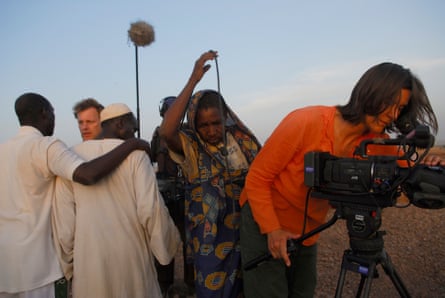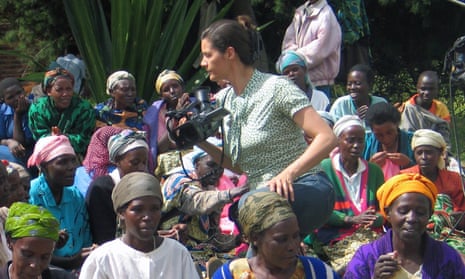“As you can probably tell, I am a really earnest person,” says cinematographer and director Kirsten Johnson, half-jokingly, when I ask her about the motivation behind her new film, Cameraperson. “I care deeply about what I do and I have the greatest love for the craft of film-making, but, at this moment, the admission of the dilemmas that documentary film-making entails seems an important issue for me.”
Johnson was forced to confront one of those dilemmas head on in 2012, when a teenage girl she had been working with in Afghanistan suddenly decided, after three years of shooting and editing, to retract her permission to be in the film. “She just said, ‘I can’t be in this, it’s too scary,’ and I was left wondering, why did I not see this coming? That was the personal moment of doubt that the film emerged out of.”
Cameraperson is a complex, self-questioning work that is entirely composed of sequences from Johnson’s previous films, which include acclaimed documentaries such as Fahrenheit 9/11, Darfur Now and Citizenfour. Determined to lay bare what she calls “the constructions of film-making”, she has in turn constructed a montage of what at first seem unconnected scenes identified only by their locations, which include a farm in Bosnia to which a Muslim family returned after the genocide there, a Brooklyn boxing arena where young contenders do battle, a beleaguered natal unit in a Nigerian hospital and a courtroom in Texas where evidence of a horrific race crime unfolded.
As the often raw footage establishes its own dissonant rhythm, it coalesces into a kind of meta-narrative in which the viewer is given a sense of what it means to be the person behind the camera, whether waiting patiently for the light to change on a hillside above a nondescript village or deciding how long to linger on an inconsolable subject’s anger or distress. In the title sequence, Johnson asks us to view the film “as a memoir”, but it is also an artful interrogation of herself and her craft, its contradictions, compromises and betrayals.

“There are so many moral and ethical crises involved in trying to make images and edit them,” says Johnson, who is best known as the cinematographer of choice for the radical documentary directors Michael Moore and Laura Poitras. “Many of the films I have made fall short of all our hopes as film-makers and activists or to make a piece of art that will actually change things politically. In fact, we most often fail completely, but there are moments of grace even among the moments of compromise and betrayal.”
There are indeed some moments of grace in Cameraperson, but its cumulative power resides to a great degree in the sequences during which Johnson’s subjects are at their most vulnerable and her approach seems most intrusive. The scenes in which a Nigerian midwife struggles to save the life of a newborn baby in a makeshift clinic are viscerally dramatic and prolonged – we even hear Johnson gasp from behind her camera at one point, while her questions grow increasingly plaintive in tone as it becomes clear that the baby’s survival is imperiled by the lack of basic medical equipment. (“The incubator was missing an adaptor plug and I had one in my case back at the hotel,” Johnson tells me quietly. “When I found that out, it was just too much to take.”)
The footage of a distraught young boxer just after he has lost an important title fight comes close to a kind of voyeuristic stalking. There is a moment when, through the red mist of his rage, he suddenly becomes aware that he is still being filmed, in which you worry for Johnson’s physical safety. Undaunted, she trails him out of the dressing room and back into the arena, where he runs, sobbing, into the arms of his mother. “That sequence actually felt like a movie was unfolding in front of me,” she says. “It was as if he was literally drawing me down the corridor into a movie and I had no agency. I was just following him, lost in the intensity of his emotion. And I kept following after the encounter with his mother until he turned and told me to stop filming.” Had she stopped earlier, the revealingly Freudian climax would have gone unrecorded, but, instead, it lays bare the dynamic of machismo more than all the bravado and staged brutality that has preceded it.
Both these intimately observed dramas rely for their raw, emotional intensity on Johnson’s willingness to transgress the usual boundaries of personal privacy, tact and even empathy. She goes the extra mile with her camera so that we can do the same at a safe distance, which is where the viewer’s complicity adds yet another level of complexity to the ethical dilemmas of her kind of edgy documentary film-making. “For the generation I came from, image-making was a rare and precious thing to do,” says Johnson, who studied cinematography at the French National Film School in the late 1980s. (Her first subject as a director-cinematographer was the philosopher Jacques Derrida, who makes a mischievously fleeting appearance in Cameraperson.) “Now, every person who has a phone can film their experiences or turn a camera on another person in trouble or at risk or emotionally vulnerable. I’m concerned as a film-maker with the lack of context that attends this kind of casual witnessing of events.”
In Cameraperson, Johnson, too, has disregarded overt context, but this serves the purpose of showing how the same dilemmas recur whether she is filming the families of the victims of mass killings in Kosovo or trailing her Alzheimer’s-afflicted mother as she wanders uncertainly through her own house. Do we look or look away? Are we bearing witness or intruding on private emotions? At what point does our concern shade into voyeurism? The questions she asks of herself are the questions we, as alert viewers, should continuously be asking of ourselves. Yet, for all its self-questioning, Cameraperson is a film that, as Johnson cheerfully acknowledges, cannot break free from the process it exposes: it, too, has been created though a process of selecting, editing and, yes, constructing images.
I ask her, in conclusion, if the decision to show glimpses of her mother’s unravelling self was the most difficult one she had to make. (Her mother has since died.) “It may not be evident to everyone who views it, but, as it pertains to my relationship with my mother, this was a profound act of betrayal,” she replies without hesitation. “I can say for sure she would not have wanted it. My father is fine with it, but some of the people who knew her are not and it has been hard at times to feel the cold force of their anger.”
Why, then, did she include it? “That is a difficult question to answer,” she says, sounding less confident and articulate than she has throughout the interview. “I don’t know if I would have been capable of it had she been around. I think that, in a way, owning that betrayal is an admission of all the betrayals of trust that have happened in the construction of all these stories. It’s as if two conflicting things can be carried in those images of my mother: our love for each other and my betrayal. That gets to the heart of what the film is attempting to lay bare: what it is to be me and what it is to do the job that I do – and love doing – even with all the contradictions and betrayals it entails.”

Comments (…)
Sign in or create your Guardian account to join the discussion